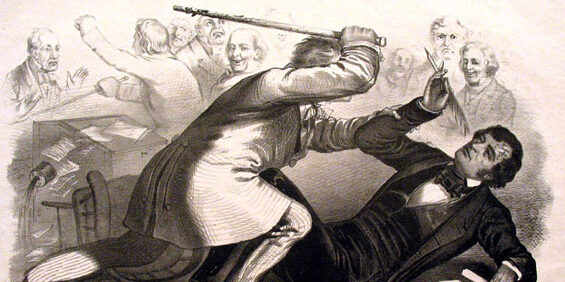The Breakdown of Politics
On the 22nd of May, 1856, Representative Preston Brooks of South Carolina entered the old Senate chamber shortly after the Senate concluded its business for the day. After sitting for a moment in an empty seat on the floor of the chamber, Representative Brooks offered to a member of the Senate staff that he hoped the attractive woman sitting just outside the Senate chamber would leave. Despite such chivalrous concerns, moments later, Representative Brooks strode to the chair of Massachusetts Senator Charles Sumner and beat him unconscious with a walking stick.
A week earlier, in a heated debate about whether Kansas should be admitted to the Union as a slave-state or as a free-state, Senator Sumner had, in Mr. Brooks’ estimation, insulted South Carolina as well the state’s Senator, Andrew Butler, who was a relative of Mr. Brooks. Reading the text of Sumner’s speech 164 years later, it still pulses with a righteous rage—questioning what South Carolina had contributed to human history and suggesting that Senator Butler had taken an “ugly” mistress—slavery.
The assault on Senator Sumner was a milestone in our country’s path to civil war. It signaled a break-down in the ability of our politics to grapple with difficult issues. Representative Brooks may have been triggered by Senator Sumner’s heated rhetoric, but throughout history violence results when politics fails to resolve complex issues, and throughout the 1850s, the United States proved incapable of resolving the issue of slavery.
I found myself contemplating this dark era in American history after watching the presidential debate on Tuesday night. In Sumner’s towering and whirling rhetoric, he asked fundamental questions about the nature of a republic, about freedom, ethics, governing, and whether the United States would ever free itself of the bondage of slavery.
In stark contrast, the disputes between contemporary Republicans and Democrats, seem substantively insignificant in comparison to the meaty issues of the decade before the Civil War. Republicans may oppose the Affordable Care Act as an unnecessary intervention in national healthcare markets, but they at least pay lip service to its popular provisions, including coverage for pre-existing conditions. Democrats may believe that the country needs to be a global leader on climate change, but during the Obama administration they saw the United States resume its global leadership as a producer of petroleum and natural gas.
I’m not suggesting that there aren’t substantial differences between the two parties—especially between the extreme wings of the parties. There are. Democrats believe in a more responsive role for government that seeks to reduce the rough-edges of economic inequality, social injustice, and discrimination in all its forms. Republicans hold, with equal conviction, to the belief that government should not intervene in human lives in ways that alters the power of free markets to self-regulate. These are big ideas and they are worthy of sustained and passionate debate.
But the spectacle we saw on Tuesday night wasn’t about big ideas or the governing philosophies of parties or candidates. I wish that it had been. In the midst of the pandemic, America deserved a debate about how we pay for healthcare. As automation threatens more and more jobs with replacement, Americans deserved a debate about the future of work. As China invests in strategic partnerships across Asia, Africa, Europe, and South America, the United States needs to have a debate about what role we want to play in the world. And as technology further dominates how we interact with one another, the American people deserve a debate about free speech before artificial intelligence makes it impossible for us to discern between things said by human beings and things said by computers.
It’s often said that politics is a tough business, but what we saw in Tuesday night’s debate wasn’t politics just as Representative Brooks’ beating of Senator Sumner wasn’t politics. Politics is how we get things done in a free society, it’s how we resolve difficult issues without killing one another. The first presidential debate wasn’t about politics, it was about power—who has it, who doesn’t, and, ultimately, what we, as a people, are willing to tolerate in those who want it or want to keep it.

